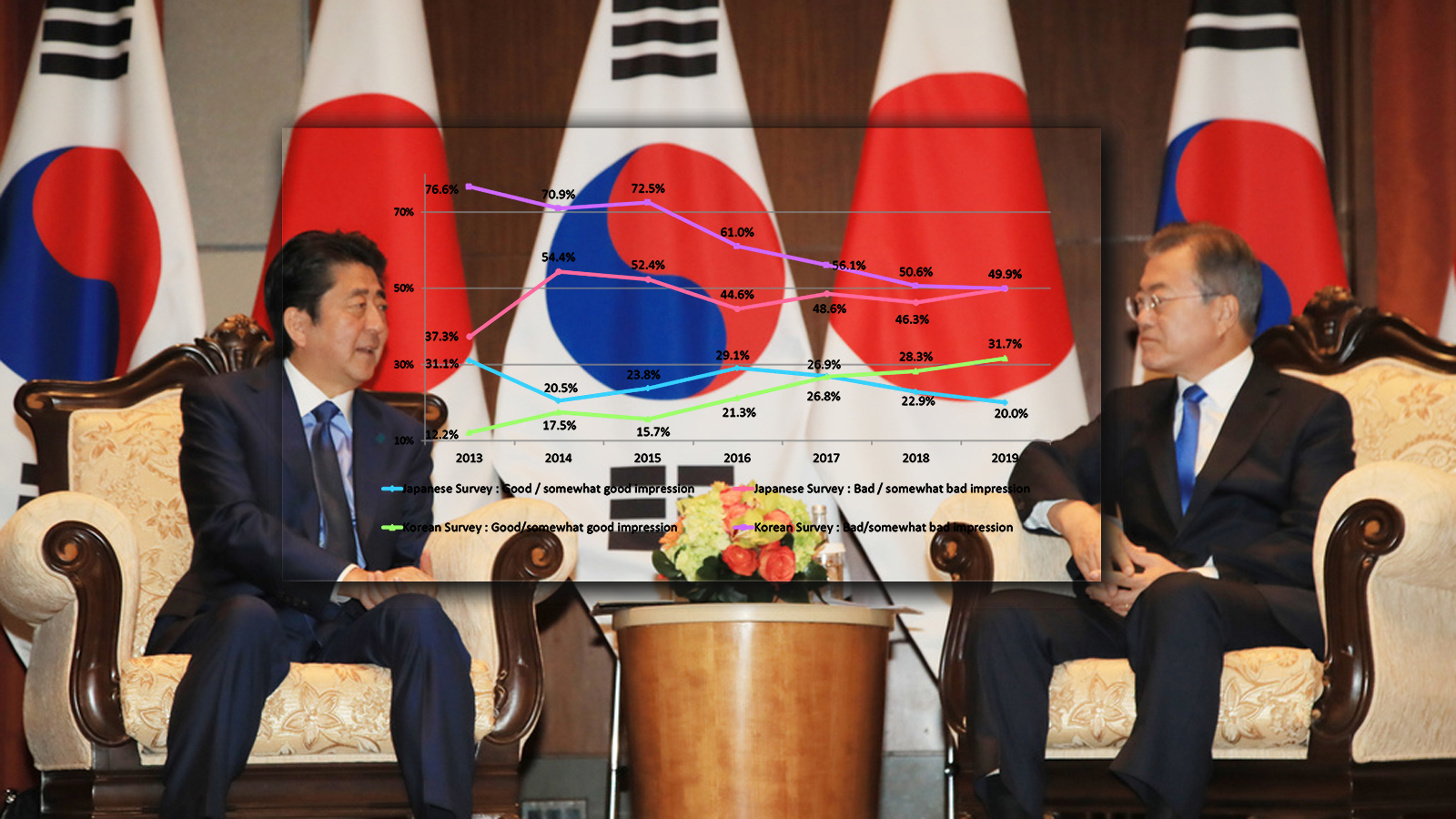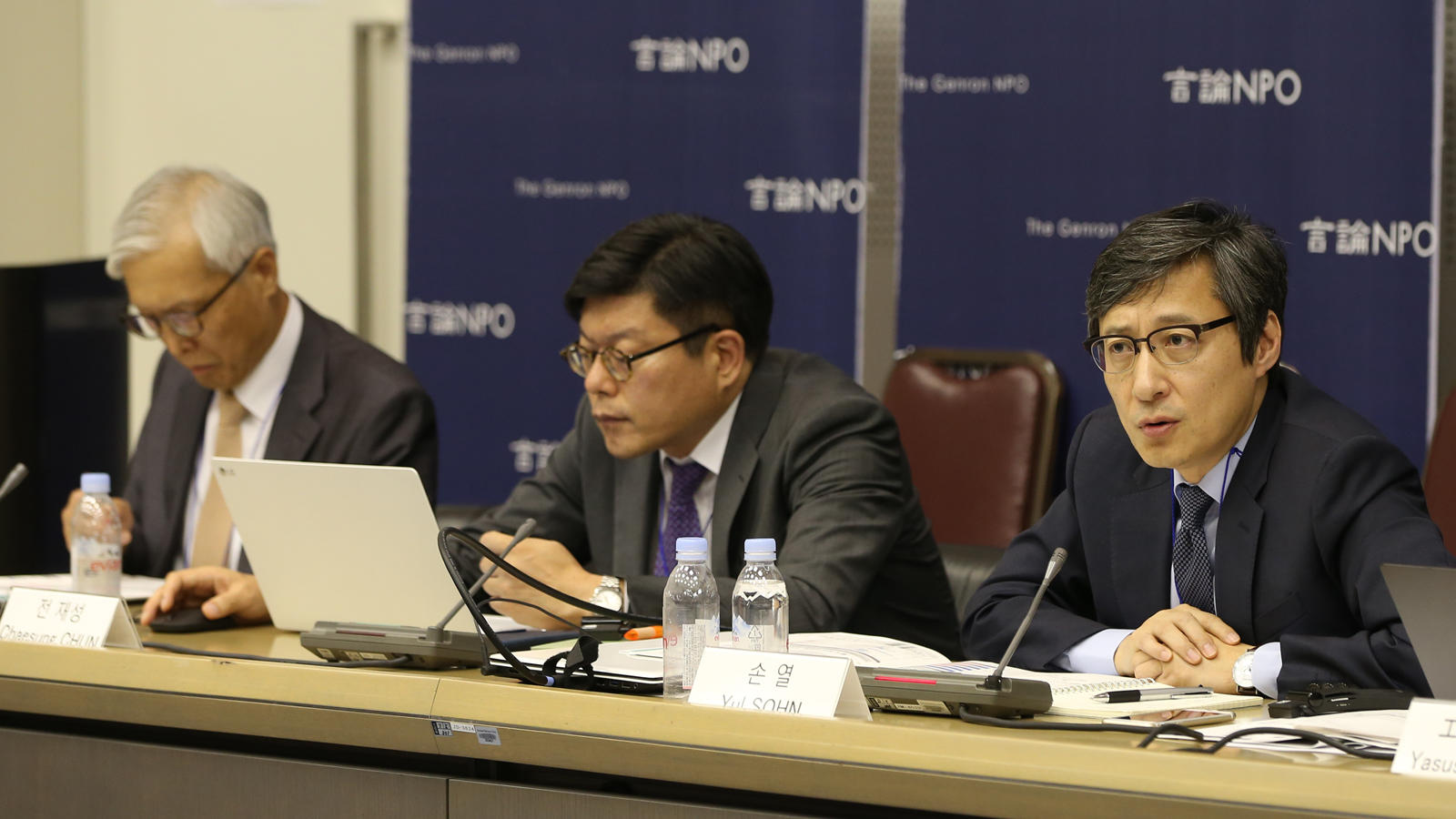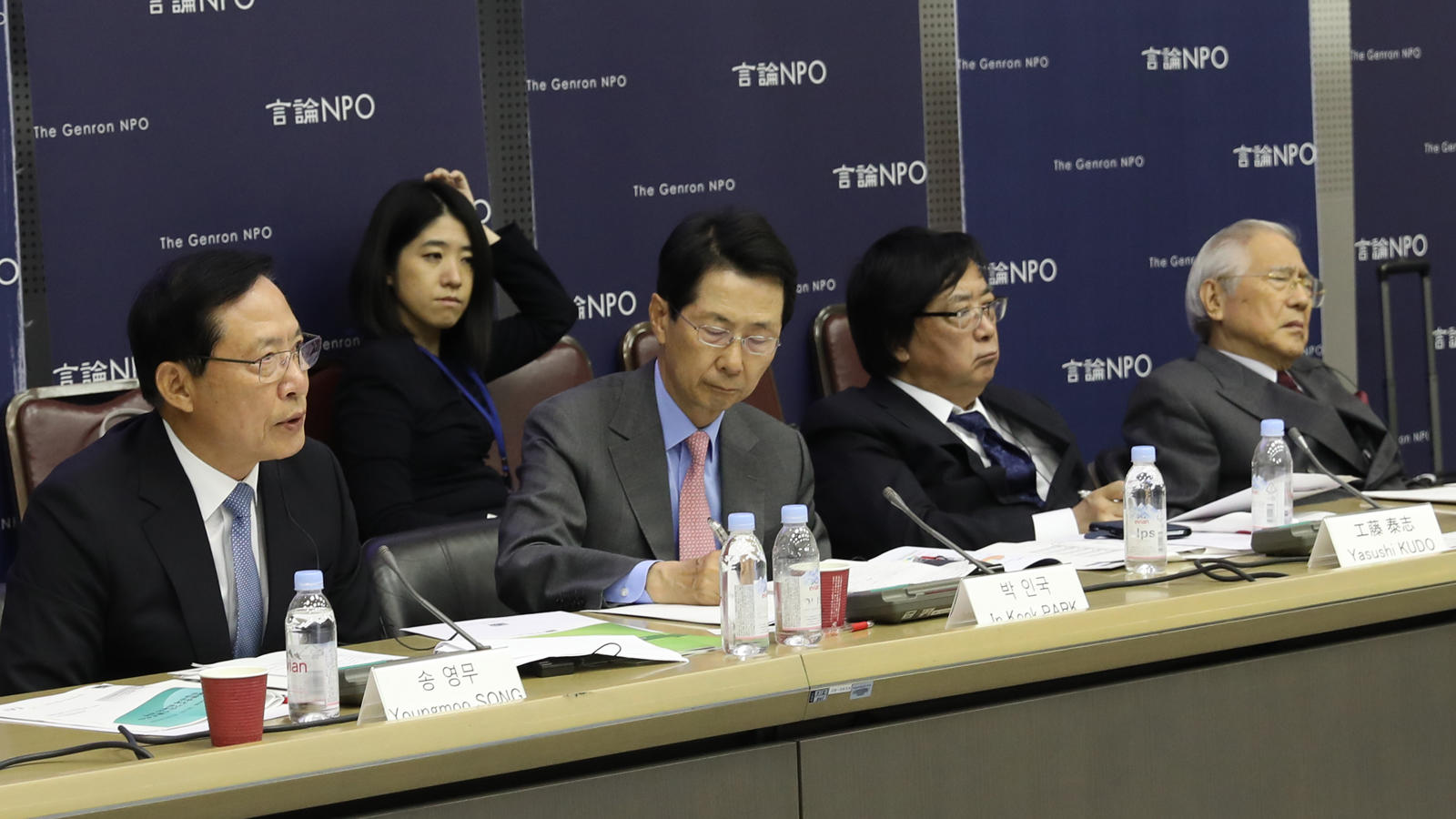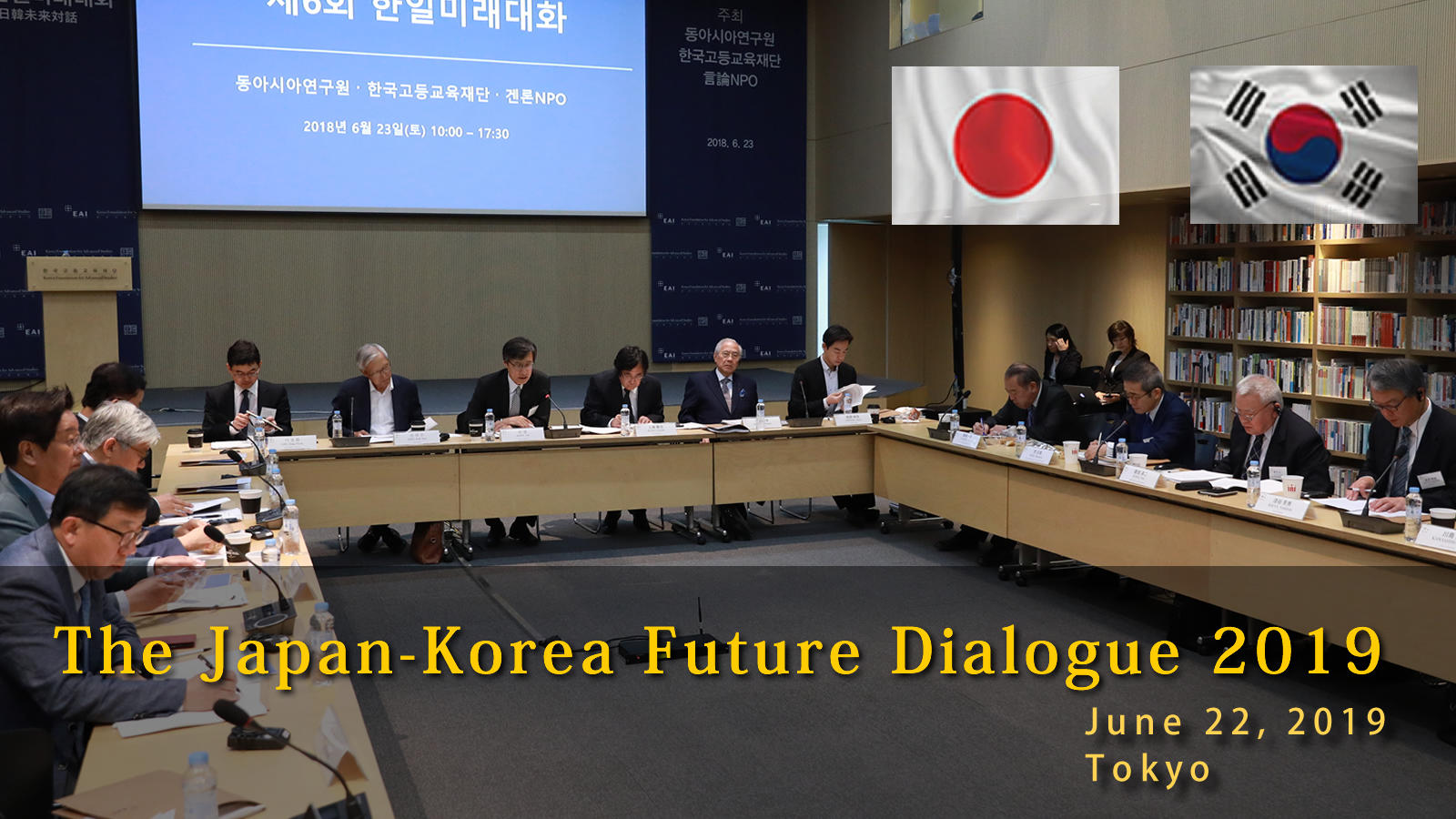 In Cooperation with:
In Cooperation with:
Japan:Public Opinion Research Institute Corporation
South Korea: Hankook Research Co.Ltd
Survey Overview
From May to June 2019, The Genron NPO and East Asia Institute (EAI) conducted joint public opinion polls in Japan and South Korea. The purpose of this annual survey is to grasp the state of mutual understanding and perception of each other among the Japanese and South Korean public and to monitor the changes over time, in order to contribute to promote greater mutual understanding between them. The result of this survey will be presented at the bilateral track II dialogue 'Japan-Korea Future Dialogue' on June 22, 2019.
The opinion poll in Japan was conducted between May 18 and June 2, targeting men and women across the country over the age of 18. Questionnaires were delivered to participants and self-administered, resulting in a collection of 1,000 valid responses. The final academic qualifications of the respondents were as follows: 48.6% of the respondents were men and 51.4% of them were women. Elementary/middle school graduates: 7.6%, high school graduates: 45.1%, junior college/technical college graduates: 21.8%, four-year university graduates: 22.7% and graduate school graduates: 1.1%. Age distribution of the respondents were as follows: under 20: 2.5%, between 20 and 29: 11.9%, between 30 and 39: 14.8%, between 40 and 49, 17.2%, between 50 and 59, 14.6%, and 60 and above: 39.0%.
The opinion poll in South Korea was conducted between May 15 and 27 by face-to-face interview method, targeting men and women aged 19 and over. 49.6% of the respondents were men and 50.4% of them were women. The number of total valid responses was 1,008. The final academic qualifications of respondents were as follows: middle school graduates or below: 13.8%, high school graduates: 39.3%, junior college/technical college graduates: 13.2%, four-year university graduates: 31.6% and graduate school graduates: 1.9%. Age distribution of the respondents were as follows; between 19 and 29: 17.3%, between 30 and 39: 16.8%, between 40 and 49, 19.6%, between 50 and 59, 19.8%, and 60 and above: 26.5%.
1. Impression
1-1. Impressions of One Another's Countries
The Japanese respondents' impression of South Korea has been the worst since the survey began in 2013, whereas South Koreans' impression of Japan has shown some improvement. The percentage of the South Koreans who have a "bad impression" of Japan dropped to less than 50% for the first time.
1-2. Reasons behind Each Other's Impressions
The top reason why Japanese has the bad impression of South Korea is "South Korea's continued criticism against Japan on historical issues", with the majority at 52.1%. Two recent incidents of the "South Korean Supreme Court ruling over the wartime labor" and the "radar lock-on dispute" are selected by 15.2% and 9% of the Japanese respectively. There were also increases in the numbers of Japanese who ascribe the emotional, patriotic behaviors of South Koreans to their bad impression of South Korea.
In regards to the reason for the bad impressions of Japan among South Koreans, more than half of the South Korean respondents chose "no remorse over Japan's past wartime aggression" and the "territorial conflict over Dokdo", especially the former have increased to 76.1% from 70% (2018).
Regarding the reasons for good impression of Japan, 69.7% of the South Koreans selected "because Japanese people are kind and earnest" and 60.3% selected "because Japan is a developed country with a high standard of living". The two options exceed others by far.
Around half of the Japanese selected "because South Korean food and shopping are attractive" (52.5%) and "because of interest in South Korean dramas, music or culture" (49.5%).



2. Present and Future Bilateral Relations
2-1. Perception of Present and Future Japan-South Korea Relations
More than 60% of both Japanese and South Korean respondents believe that the bilateral relations have deteriorated. 63.5% of the Japanese perceive the bilateral relations as "bad", a 23-percentage-point increase from 40.6% (2018). 66.1% of the South Koreans feel the same, an 11-percentage-point increase from 54.8% (2018). Only 6.1% of the Japanese and 3.7% of the South Korean think that the relations between the two countries are "good".
As for the future prospects, 33.8% of the Japanese and 18.7% of the South Koreans believe that the bilateral relations will continue to deteriorate. The results show that Japanese are more pessimistic about the future of Japan- South Korea relationships.


2-2. Is Japan/South Korea a friendly nation?
43.9% of the Japanese and 65.6% of the South Koreans do not consider the other country as a friendly nation. 52.9% of South Koreans "never considered Japan as a friendly nation" while 21.4% of Japanese feel that South Korea "used to be a friendly nation, but do not think so now."

2-3. What Should be Done to Improve Japan-South Korea Relations?
While more than 70% of South Koreans think that the two countries "should make efforts to improve the relationships," only 40% of Japanese feel the same. Yet, the majority of Japanese think that both countries should "avoid confrontation" or should "overcome the difficulties in a future-oriented manner."
As regard to a question "what should be done to improve Japan-South Korea relations," the vast majority of both nationals feel that it is necessary to resolve "territorial disputes over Takeshima/Dokdo" and issues relating to "historical recognition".
As for the South Korean side, those who feel the "strengthening economic cooperation" will be an effective measure have tripled to 18.3 % since 2018. There is a notable gap in whether the "cooperation in resolving North Korea's nuclear issues" will contribute improving the Japan-South Korea relations. 22.4% of Japanese say it will contribute while only 5.1% of South Koreans think the same.


2-4. How Both Nationals View the Importance of Bilateral Relations
While 84.4% of the South Koreans consider Japan-South Korea relations "important", only 50.9% of Japanese think the same, hitting the lowest point since the survey began.
Among Japanese who consider the relationships important, when they are asked why, many chose rather general reasons such as "because we are neighbors" or "as same Asian nations," while many South Koreans looked into more economic importance of Japan as the two countries "have many common interests by he economic interdependency" and Japan "as trade partner." While 22.4% of the Japanese chose "because we have common security interests as allies of the United States", only 9.8% of the South Koreans think the same.


2-5. Importance and Sense of Affinity as Compared to China
Concerning Japan-South Korea relations in comparison with their relations with China, approximately 40% of the Japanese and more than 50% of the South Koreans feel that "both are equally important". Yet, more than 30% of South Koreans consider relations with China to be more important. Only 5.6% of the Japanese and 5.5% of the South Koreans think Japan-Korean relations more important than those with China.
Regarding the sense of affinity toward each other as compared to China, there is a slight difference in the perception of Japanese and South Koreans. The top answer by the Japanese remains the same as last year; "no affinity felt towards neither" (36.8%). The highest percentage (25.9%) of the South Koreans feel "more affinity toward China." In terms of the affinity toward each other, 26.9% of the Japanese feel "more affinity toward South Korea", and only 17.8% of the South Koreans feel "more affinity toward Japan".
When comparing the sense of affinity toward the United States and China, more than 60% of both countries' respondents feel "more affinity towards the U.S." Those who feel "more affinity toward China than the U.S." were mere 6.3% among the South Koreans and 3.3% among the Japanese.


2-6. Countries Important to the Future of Japan/South Korea
Both Japanese and South Koreans view that the "United States" is the most important country for them when they consider their nation's future. It is notable that the percentage of Japanese who selected "the U.S." rose to 67.8%, surpassing other countries by far. The South Koreans also selected the U.S. as their top choice with just above the majority at 55.5%, followed by China at 33.3%.
Merely some 1% of respondents of the two countries consider each other as the most important country to their nation's future.

3. Political Leader and the Diplomatic Relations
3-1. Impressions of One Another's Leader
The Japanese who have "bad" impression of South Korean President Moon Jae-in doubled since last year, exceeding the majority to 50.8%. South Koreans' "bad" impression of Prime Minister Abe remains very high as previous year at nearly 80%.


3-2. Approval on Japanese/South Korean government's attitude toward each other
Nearly 60% (57.3%) of the Japanese see the Moon administration's attitude toward Japan unpreferable, while 35.4% of the South Koreans see the same, exceeding 21.5% of those who see it on a positive note.
As regards to Japanese view on Abe administration's attitude toward South Korea, their opinion is divided.

4. Basic Understanding
4-1. Understanding of the Social/Political Systems
The majority of the Japanese continue to view South Korea as "ethno nationalism" while close to half of the South Koreans still view Japan as a "militaristic" country. An increasing number of South Korean also sees Japan as "hegemonistic". Only just over 20% of respondents of both countries consider the other country as "democratic."

5. People-to-people Exchange
5-1. Interest in Visiting One Another's Countries
The percentage of the Japanese who "want to go" to South Korea remains at 34.3%, exceeded by those who "do not want to go" (41.8%). Contrarily, 65.9% of the South Koreans "want to go" to Japan although the percentage has decreased since 2018.
Regarding the purposes of the visits, "shopping" became the top answer among the Japanese for the first time since the survey began. On ontrary, the top reason for the South Koreans to visit Japan is "exploring nature and sightseeing" which exceeds 90%.

6. Perceptions of Historical Issues
6-1. Views on Historical Issues between Japan and South Korea
The survey revealed that an increasing number of South Koreans call for resolving historical issues between the two countries as a precondition for the development of the bilateral relations. The percentage of South Korean respondents who consider that "bilateral relations will not improve unless historical issues are resolved" has increased from 33.5% (2018) to 39.1% this year. In contrast, Japanese tend to consider that "the historical issues are difficult to be resolved even if bilateralrelations improve."
As for historical issues that need to be solved, the majority of Japanese continue to select South Korea's "anti-Japan education" and "anti-Japan behavior." Nearly 40% of Japanese still chose "comfort women issue". Notable increase is observed in the percentage of Japanese who indicated "South Korean politicians' remarks on Japan" from 29.2% (2018) to 35.7% in 2019. 11.3% also named the issue of "wartime forced labor reparation."
As for the South Korean side, while the top priority continues to be the "comfort women issue" selected by more than 70%, "wartime labor reparation" has increased by 16% this year, exceeding 60%.



6. Perceptions of Historical Issues
6-1. Views on Historical Issues between Japan and South Korea
The survey revealed that an increasing number of South Koreans call for resolving historical issues between the two countries as a precondition for the development of the bilateral relations. The percentage of South Korean respondents who consider that "bilateral relations will not improve unless historical issues are resolved" has increased from 33.5% (2018) to 39.1% this year. In contrast, Japanese tend to consider that "the historical issues are difficult to be resolved even if bilateralrelations improve."
As for historical issues that need to be solved, the majority of Japanese continue to select South Korea's "anti-Japan education" and "anti-Japan behavior." Nearly 40% of Japanese still chose "comfort women issue". Notable increase is observed in the percentage of Japanese who indicated "South Korean politicians' remarks on Japan" from 29.2% (2018) to 35.7% in 2019. 11.3% also named the issue of "wartime forced labor reparation."
As for the South Korean side, while the top priority continues to be the "comfort women issue" selected by more than 70%, "wartime labor reparation" has increased by 16% this year, exceeding 60%.


6-2. Views on the South Korean Supreme Court ruling on the wartime labor
Regarding the South Korean Supreme Court's ruling, ordering Japanese firms to compensate wartime forced laborers, 75.5% of the South Korean respondents support the court decision, while 58.7% of Japanese see it unpreferable and 33.6% answered "I do not know".
In response to question regarding what should be done to resolve the issue, nearly 60% of the South Koreans think that "Japanese firms should make compensation in accordance with the Supreme Court order." Contrarily, only 1.2% of Japanese agree with it. Many Japanese consider that they should seek a solution through "arbitration, or the International Court of Justice" or consider that "compensation should be mede by Korean Government." Moreover, 55% of Japanese agree that the Japanese Government should take retaliatory measures if assets of Japanese firms are seized and monetized.


7. Military and Security Issues in East Asia
7-1. The Radar Lock-on Dispute
Regarding the radar lock-on incident, about 60% of each country's respondents believe the legitimacy of their own governments' claims. None of Japanese respondent considers that "Korean Government's claim is legitimate"

7-2. Support for Japan-South Korea Defense Cooperation
In the presence of the dispute over the radar lock-on incident involving the Japanese Defense Force and the Korean Navy, the survey asked whether Japan and South Korea should pursue defense cooperation: the results show that only 12.8% of the Japanese and 20.4% of the South Koreans respectively answered that they should. The top response is that "the military (defense) authorities should first improve their communications and restore the trust before seeking further defense cooperation", selected by 44.9% of the South Koreans and 40.1% of the Japanese.
The survey also asked whether the military alliance with the United States of the other country is necessary for their own nation's security: Just over 40% of the Japanese and nearly 60% of the South Korean think the other countries' cooperation with the U.S. is important for their own security.
Regarding the question whether to support strengthening of Japan-South Korea-United States trilateral military-security cooperation, 45.8% of the Japanese avoided clear judgement and responded "I do not know", but 43.3% support the idea, increased by 8% from the 2018 survey. 66.2% of the South Koreans support the idea to strengthen the trilateral cooperation.
As to reasons for supporting the trilateral military-security cooperation, notable majorities, six in ten of the Japanese and seven in ten of the South Korean, answered because "it is crucial for the peace and stability of the Korean peninsula." The second highest answer selected by the Japanese: "to strengthen North-East Asia's security system under the U.S. umbrella" was supported by a sizable 40.2%, whereas only 15.6% of the South Koreans selected the same option. Instead, about 40% of South Korean chose "to counterbalance with the rise of Chinese military power." The percentage of Japanese who selected the same option dropped by 15 percentage points to just over 30% since 2018.
The survey also asked South Korean the reason for disagreement with the military cooperation. More than 60% responded that "it increases the tension on the Korean Peninsula," an increase of 11 percentage points since the 2018 survey. The top answer of 2018 "cannot trust each other due to historical issues" dropped by 31 percentage points to 24.7%.


7-3. Views on Military Threats and Possible Military Conflict
More than 70% of both Japanese and South Koreans feel military threats from North Korea. The percentage increased 6 percentage points since the last survey in South Korea where North-South summit took place three times over the past year. About 40% of both nationals view China as a military threat. Four in ten of South Koreans continues to feel that Japan poses a military threat, while only 12.3% of Japanese consider South Korea as a military threat, although the percentage increased by 5 percentage points since 2018.
As to the reasons for South Koreans to view Japan as a military threat, many Koreans indicate "territorial dispute over Takeshima/Dokdo and right-ward tilt/militarism resurgence of some Japanese.
In terms of the possibility of military conflict between Japan and South Korea, close to 60% of the Japanese believe that conflict "will not occur". Among South Koreans, combining the percentage of those who responded "within a few years" and "eventually", nearly 30% still believe the military conflict "will occur".


8. North Korea's Nuclear Issues
8-1. North Korea's Development of Nuclear Weapons
Since 2018, continued diplomatic efforts have been made for the complete denuclearization of North Korea, including three North-South Summit meetings and two U.S.-North Korea Summit meetings. Nevertheless, an increasing number of both Japanese and South Koreans are skeptical about the progress: 47.4% of the Japanese answered that the denuclearization would be "difficult in the end" or "never thought it would happen in the first place". Among the South Koreans, 34.5% are skeptical (chosen either of the denuclearization would be "difficult in the end" or "never thought it would happen in the first place"). This exceeds 31.4% who responded that it will happen (chosen either of the denuclearization "will be realized in a short time" and "will eventually be realized but take long time"). Comparing with the 2018 results where nearly 60% (59.3%) of South Korean responded that either the denuclearization "will be realized in a short time" or "will eventually be realized but take long time", this year's result shows that pessimistic views grew in South Korea over the past year.

8-2. Support for Japan's Active Contributions for the Future Peace Processes on Korean Peninsula
Regarding the question whether the Japanese Self-Defense Forces should support the U.S. Forces stationed in South Korea when conflict arises in the Korean Peninsula, 72.3% of the Japanese and 57.5% of the South Koreans responded negative, while 42.1% of the South Koreans responded affirmative.
Regarding the Japanese contribution to the peace process on the Korean Peninsula, 49.5% of the Japanese supported the active contribution by Japan, while less than 10% (9.5%) responded that Japan "should not be involved." As for the South Koreans, the response is mixed as 39.5% responded positive while 35.7% responded negative on Japan's involvement.

9. Economic Relations
9-1. Economic Relations between Japan and South Korea
In terms of economic relationship between Japan and South Korea, more than 40% of the Japanese view South Korea's economic growth to be "beneficial" to Japan, but there was a decrease from 2018. The public opinion is divided in South Korea, where more than 40% view Japan's economic growth as "beneficial", while more than 30% view it as a threat.
As for the economic cooperation between the two countries, more than 80% of the South Koreans consider it necessary, while only some 40% of Japanese think the same. It is notable that more than 20% of Japanese do not think the economic cooperation with South Korea "unnecessary."

9-2. Countries and Regions of Economic Importance to Japan/South Korea
More than 70% of the Japanese responded that "the Unites States" is the most "important country" in terms of economic relation with Japan. "China" was the second important country, chosen by nearly half of the Japanese respondents. Only some 20% named South Korea.
On the other hand, more than 80% of South Koreans said that "China" is the most important country, exceeding "the United States" which was selected by some 70% of the South Koreans. The percentage who selected "Japan" has increased by 13 percentage points since last year, and became close to 50%.

Yasushi Kudo President, The Genron NPO
Yuho Nishimura Director, The Genron NPO
Aya Sato Deputy Director, The Genron NPO
HSB Teppozu 4F, 1-1-12 Minato, Chuo-ku, Tokyo Japan, 104-0043
Tel/Fax +813-6262-8772 / +813-6262-8773
info@genron-npo.net






Post a comment